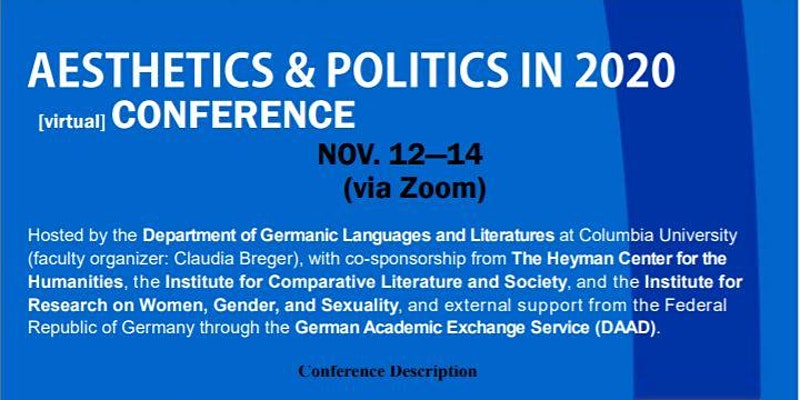
End Date : November 14, 1:00 pm
On Zoom
Please register here:
https://www.eventbrite.com/e/aesthetics-politics-in-2020-tickets-126084432933
Hosted by the Department of Germanic Languages and Literatures at Columbia University (faculty organizer: Claudia Breger)
The Society of Fellows and Heyman Center for the Humanities, the Institute for Comparative Literature and Society, and the Institute for Research on Women, Gender, and Sexuality, and external support from the Federal Republic of Germany through the German Academic Exchange Service (DAAD).
Aesthetics and Politics in 2020: A Workshop November 12-14, 2020 (via zoom).
Conference Description
On which grounds can we claim, in 2020 and with scholarly confidence, that a literary text has “progressive” or “right-wing” affinities? How does a live performance’s evidently intended critique of racist or homophobic dispositifs actually succeed (or fail)? What justifies the declaration that a film unfolds a revolutionary sensibility—or more pragmatically, contributes to working through unprecedented social crisis? Questions such as these could not be more topical today against the backdrop of new fascisms and heated public conflict in an age of heightened emergency and precarity, fear, anger, and hate. In the German context, resonant inquiries have flared up in recent debates around individual authors’ or texts’ uncanny proximities with rightwing movements but also in a resurgence of interests in (progressive, egalitarian, anti-fascist) activist political aesthetics.
This workshop emerged from a graduate seminar connecting twentieth-century German critical thought about aesthetics and politics to twenty-first century debates around art and reading in affect, queer, and critical race studies. While inspired by the range of connections we were able to make, we also noticed that aesthetic theory offers surprisingly few fresh and specifically developed answers to our questions. The workshop therefore re-envisions these questions from two (intertwined) angles:
- a) Building on recent debates about “critical” and “postcritical” reading methodologies in the humanities, we want to look more closely at—and specify—the ways in which we read politically today.
- b) At the intersection of the modernist tradition of political aesthetics with contemporary new materialisms, affect studies, and more, we will aim to finetune the agency of artworks in their relationships with society: What does or can art actually do politically?
Presenters have been given the charge to develop their answers by starting from adverbs (-> “reading [how]”) and verbs (-> “art [does]”) respectively.
Please register here:
https://www.eventbrite.com/e/aesthetics-politics-in-2020-tickets-126084432933
Conference Program
Please note: The external talks and the Friday roundtable will be live; Columbia-internal papers (both students and faculty) will be pre-recorded. The live sessions on the internal papers will be discussion-focused.
Thursday, November 12
Keynote Lecture (webinar)
6 pm: Tavia Nyong’o (Professor of African American Studies, American Studies, and Theater and Performance Studies, Yale University): The Politics of Fabulation
Moderation: Claudia Breger, Villard Professor of German and Comparative Literature
Friday, November 13
Artistic Acts in Response to War, Revolution, and the Rise of Fascism
(Starting from Verbs)
10 am Vance Byrd (Frank and Roberta Furbush Scholar and Associate Professor of German Studies, Grinnell College): Opening the Wounds: Appropriation as Physical and Material Methodology in Mark Bradford’s Pickett’s Charge
Moderation: Annie Pfeifer, Assistant Professor of Germanic Languages and Literatures
11am Break
11:30 am Internal Panel (discussion-based)
Moderation and Response: Camille Robcis, Associate Professor of History and French
Anna Langewiesche: Recording, Reconfiguring, Rehabituating: Michelet’s Revolutionary Poetics in Histoire de la Révolution française
Didi Tal: The Theater of History. Reenacting the French Revolution in Georg Büchner, Peter Weiss, and Heiner Müller
Hazel Rhodes: Staying Lucid, Caring, Calling Out: Isherwood’s Berlin Stories
12:15 Lunch break
Political Reading in the Age of Postcritique (Starting from Adverbs)
1:30 pm Beverly Weber (Associate Professor of Germanic Languages and Jewish Studies, University of Colorado, Boulder): Reading Decolonially: Towards a Politics of Place
Moderation: Silja Weber (Lecturer, Germanic Languages and Literatures)
2:30 pm Break
2:45 pm Internal panel (discussion-based)
Moderation and Response: Andreas Huyssen, Villard Professor Emeritus of German and Comparative Literature
Cosima Mattner: Reading Empirically, Getting Close: Thoughts between Walter Benjamin and Today
Annie Pfeifer (Assistant Professor of Germanic Languages and Literatures): Reading ‘Benjaminian-ly’ Today
3:30 pm Break
4:30 pm Columbia Faculty Roundtable: How We Read Politically TodaY (Webinar)
Moderation: Claudia Breger
Nico Baumbach, Associate Professor, Film/School of the Arts
Jack Halberstam, Director of the Institute for Research on Women, Gender and Sexuality, Professor of English and Comparative Literature
Marianne Hirsch, William Peterfield Trent Professor of English, Director of Graduate Studies, IRWGS
Gil Hochberg, Ransford Professor of Hebrew and Visual Studies, Comparative Literature, and Middle East Studies
Bruce Robbins, Old Dominion Foundation Professor in the Humanities, Department of English and Comparative Literature
Saturday, November 14
Critical Reading and Postcritical Poetics: In the Contemporary Moment
10 am Olivia Landry (Assistant Professor of German, Lehigh University): In Defense of Anger
Moderation: Mark Anderson, Professor of Germanic Languages and Literatures
11am Break
11:30 am Internal panel (discussion-based)
Moderation and Response: Claudia Breger
Zachary Desjardins-Mooney: From Resistance to Reconfiguration: The “Everyday” in Chantal Akerman’s Jeanne Dielman
Luca Arens: Re/-producing Futurity: The Narrative Cell Biologies of Uwe Tellkamp and Alexander Kluge
Thomas Preston: The Body’s Language in Slaboshpytskiy’s The Tribe and Grisebach’s Western
12:15pm Closing Words







